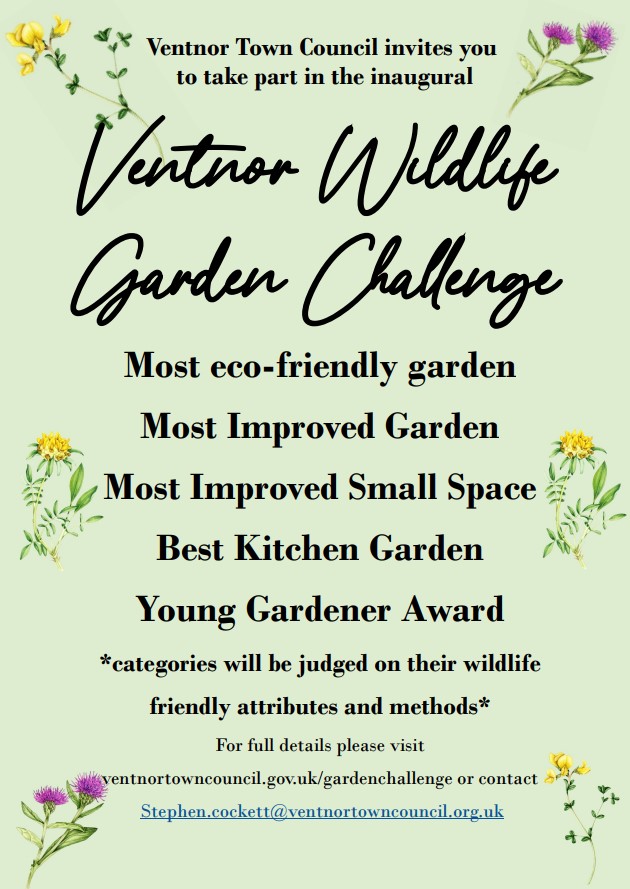Ventnor Town Council invites you
to take part in the inaugural Wildlife Garden Challenge

Wildlife Friendly Gardening For Nature, Climate and Us
The wild gardens initiative forms part of Ventnor Town Council’s commitment to contribute to aiding nature, our climate and all of us living on the planet. It is often said that the climate crisis is so large, that people don’t know where to start. Little changes to lifestyles, behaviours and how organisations do business does and will add up to a sufficient amount of good for the climate and planet. That is why we cordially invite residents to have a go at wilding their own gardens, as even the smallest of changes will make a difference. Whether it’s a small part of your garden that you dedicate to supporting wildlife, insects or wild meadow seeding, or a large part of your garden. Whatever you decide, it will make a positive difference in helping our planet and the collective life force upon its surface to flourish, whilst supporting carbon emission reduction.
Prizes will be awarded for the following categories
Best garden: best overall garden based upon wildlife friendly plantings and methods.
Best small garden: best small space for – courtyard, balcony, or garden under 20 square meters – for wildlife and planting.
Most improved: best garden space that can demonstrate being in transition towards being a haven for flora and fauna using ecologically sound methods.
Best kitchen garden: using organic techniques to produce fruits vegetables and herbs.
Young gardener award: special category for a young person who can demonstrate the knowledge, skills and behaviour of a wildlife friendly gardener.
Judging
Judging will take place at the end of August.
With the help of local experts’ gardens will be marked on how many wildlife friendly features they have, the richness of species, with particular merit awarded for native species and pollinator friendly planting and other ecologically sound methods employed such those listed in the suggestions.
Suggestions
There are many sources of information available online to help steer people towards more wildlife friendly gardens.
We can particularly recommend the following webpages for inspiration and information:
https://www.rspb.org.uk/birds-and-wildlife/advice/gardening-for-wildlife/
https://www.hiwwt.org.uk/wildlife-gardening
Here’s some things to get you started!
• Rewild an area of garden to attract insects and invertebrates, which will in turn attract animals higher up the food chain. Here are some ideas as to how to achieve this:
• Stop mowing an area of lawn to let wild flowering plants spread across it. Seeds can lay dormant for years in the soil, just waiting for a chance to germinate.
• Plant wildflowers from seed. Choose bee and other pollinator friendly seeds.
• Swap artificial turf for grass. Nothing can live in artificial turf.
• Use porous paving for your patio to prevent flooding after heavy rain.
• Swap fences for hedges. They can shelter nesting and over-wintering birds, and provide food for birds and insects.
• Use a rainwater butt, saving water.
• Compost garden waste or subscribe to the Council’s Garden Waste Collection Scheme.
• Don’t use compost on wild plants. They thrive on unimproved soil.
• Don’t use any chemical weedkillers, insecticides or slug and snail-killing chemicals. Weed by hand when necessary. Slugs and snails can be caught at night and removed from seedlings.
• Plant specific herbs to deter certain insects from eating your vegetables.
• Don’t use peat-based compost. Peat is an important carbon sink and should not be dug up.
• Provide bird-feeding stations and water. Keep them clean to prevent bacterial infections in wildlife.
• Provide insect hotels to provide shelter in winter.
• Provide bird and bat boxes for nesting.
• Provide a pond with sloping sides for wildlife to drink from and not fall in.
• Provide a pond to encourage aquatic life. Choose only native plants and avoid invasive species that can deoxygenate the water and entirely cover the pond in dense foliage.
• Provide red squirrels with rope bridges and tree feeders to keep them safe from predators on the ground.
• Leave gaps under fences for hedgehogs to travel between gardens and for newts and frogs to travel to and from your pond.
• Join others in community seed and plant swaps (Ventnor Library has a swap table).
Entry
To enter the challenge please drop an email to Stephen.cockett@ventnortowncouncil.org.uk including your name, address, and the category that you wish to enter.